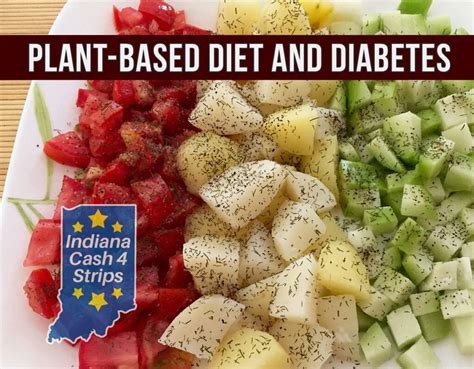Diabetes Associations Recognize Plant-Based Diets
Plant-based diets are the single most important—yet underutilized—opportunity to reverse the pending obesity and diabetes-induced epidemic of disease and death. Dr. Kim Williams, immediate past […]

Plant-based diets are the single most important—yet underutilized—opportunity to reverse the pending obesity and diabetes-induced epidemic of disease and death.
Dr. Kim Williams, immediate past president of the American College of Cardiology, started out an editorial on plant-based diets with the classic Schopenhauer quote: “All truth passes through three stages. First, it is ridiculed. Second, it is violently opposed. Third, it is accepted as being self-evident.” In 2013, plant-based diets for diabetes were in the “ridiculed” stage in the official endocrinology practice guidelines and placed in the “Fad Diets” section. The guidelines acknowledged that strictly plant-based diets “have been shown to reduce the risk for T2DM [type 2 diabetes] and improve management of T2DM” better than the American Diabetes Association recommendations, then inexplicably went on to say that it “does not support the use of one type of diet over another” with respect to diabetes or in general. “The best approach for a healthy lifestyle is simply the ‘amelioration of unhealthy choices’”—whatever that means.
But, by 2015, the clinical practice guidelines from the same professional associations explicitly endorsed a plant-based diet as its general recommendation for diabetic patients. The times they are a-changin’!
As I discuss in my video Plant-Based Diets Recognized by Diabetes Associations, the American Diabetes Association itself is also now on board, listing plant-based eating as one of the dietary patterns acceptable for the management of the condition. The Canadian Diabetes Association, however, has really taken the lead. “Type 2 diabetes mellitus is considered one of the fastest growing diseases in Canada, representing a serious public health concern,” so it isn’t messing around and recommends plant-based diets for disease management “because of their potential to improve body weight and A1C [blood sugar control], LDL-cholesterol, total cholesterol and non-HDL-cholesterol levels, in addition to reducing the need for diabetes medications.” The Canadian Diabetes Association uses the Kaiser Permanente definition for that eating pattern: “a regimen that encourages whole, plant-based foods and discourages meats, dairy products and eggs, as well as all refined and processed foods,” that is, junk.
It recommends that diabetes education centers in Canada “improve patients’ perceptions of PBDs [plant-based diets] by developing PBD-focused educational and support as well as providing individualized counseling sessions addressing barriers to change.” The biggest obstacle identified to eating plant-based was ignorance. Nearly nine out of ten patients interviewed “had not heard of using a plant-based diet to treat or manage T2DM.” Why is that? “Patient awareness of (and interest in) the benefits of a plant-based diet for the management of diabetes…may be “influenced by the perception of diabetes educators and clinicians.” Indeed, most of the staff were aware of the benefits of plant-based eating for treating diabetes, yet only about one in three were recommending it to their patients.
Why? One of the common reasons given was they didn’t think their patients would eat plant-based, so they didn’t even bring it up, but “[t]his notion is contrary to the patient survey results that almost two-thirds of patients were willing” to at least give it a try. The researchers cite the PCRM Geico studies I’ve covered in other videos, in which strictly plant-based diets were “well accepted with over 95% adherence rate,” presumably because the study participants just felt so much better, reporting “increased energy level, better digestion, better sleep, and increased satisfaction when compared with the control group.”
A number of staff members also expressed they were unclear about the supportive scientific evidence as their second reason for not recommending this diet, but it’s been shown to be more effective than an American Diabetes Association–recommended diet at reducing the use of diabetes medications, long-term blood sugar control, and cholesterol. It’s therefore possible that the diabetes educators were simply behind the times, as there is “a lag-time” in the dissemination of new scientific findings from the literature to the clinician and finally to the patient. Speeding up this process is one of the reasons I started NutritionFacts.org.
As Dr. Williams put it, “the ‘truth’ (i.e., evidence) for the benefits of plant-based nutrition continues to mount. This now includes lower rates of stroke, hypertension, diabetes mellitus, obesity, myocardial infarction, and mortality [heart attacks and cardiac death], as well as many non-cardiac issues that affect our patients in cardiology, ranging from cancer to a variety of inflammatory conditions.” We’ve got the science. The bigger challenge is overcoming the “inertia, culture, habit, and widespread marketing of unhealthy foods.” He concludes, “Reading the existing literature and evaluating the impact of plant-based nutrition, it clearly represents the single most important yet underutilized opportunity to reverse the pending obesity and diabetes-induced epidemic of morbidity and mortality,” disease and death.
I highlighted the PCRM Geico studies in my videos Slimming the Gecko and Plant-Based Workplace Intervention.
Aren’t plant-based diets high in carbs? Get the “skinny” by checking out my video Flashback Friday: Benefits of a Macrobiotic Diet for Diabetes.
To learn more about diet’s effect on type 2 diabetes, see the related videos below.

 mainadmin
mainadmin 










